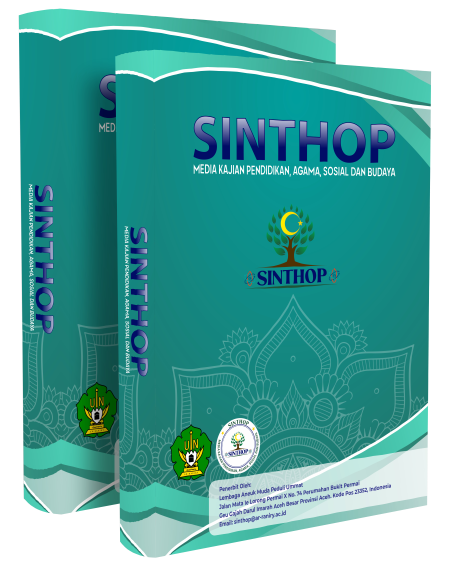Al-Ghazali’s Refutations of Philosophers: Examining Tahafut al-Falasifah on Eternity, Divine Knowledge, and Resurrection
DOI:
https://doi.org/10.22373/sinthop.v3i2.6470Keywords:
Al-Ghazali, Tahafut al-Falasifah, Islamic theology, philosophy, bodily resurrection, eternity (qadim)Abstract
Al-Ghazali, a pivotal scholar in Islamic intellectual history, is renowned for his systematic critique of philosophical ideas that challenged Islamic theology during his time. His landmark work, Tahafut al-Falasifah (The Incoherence of the Philosophers), addressed the doctrines of prominent Muslim philosophers such as Al-Farabi and Ibn Sina, who sought to reconcile Greek philosophy with Islamic teachings. Using a library-based research approach and analytical methods, this study examines Al-Ghazali’s refutations, particularly his objections to the concepts of the universe's eternity, God’s limited knowledge of particulars, and the denial of bodily resurrection. By categorizing philosophical thought into acceptable, heretical, and unbelief categories, Al-Ghazali delineated the boundaries of religious orthodoxy in response to these debates. His critical approach not only fortified Islamic theological principles but also established a framework for reconciling reason and faith. This study underscores Al-Ghazali’s enduring influence in Islamic thought and highlights the relevance of his arguments in contemporary discussions on philosophy and religion.
References
Al-Ghazali, A. H. (2015). Keracunan Filsafat (Tahafut al-Falasifah) (Terj. Achm). Forum.
Al-Ghazali, A. H. (2020). Al-Munqidz min al-Dhalal (Terj. Bahr). Al-Musqist Pustaka.
Al-Jisr, N. (2005). Mengembara Mencari Tuhan: Sebuah Novel Religius Petualangan Intelektual dalam Menemukan Kebenaran (Terj. M. M). Q-Press.
Al Adnani, A. F. (2013). Kitab Ar-Risalah: Negeri-Negeri AKhir Zaman (Sebuah Tujuan Futuristik Tentang Nubuwwah Rasulullah SAW. Granada.
Atabik, A. (2014). Telaah Pemikiran Al-Ghazali tentang Filsafat. Fikrah, 2(1).
Drajat, A. (2006). Filsafat Islam Buat Yang Pingin Tahu. Erlangga.
Hanafi, A. (1990). Pengantar Filsafat Islam (Cetakan IV). Bulan Bintang.
Juwaini. (2013). Konsep al-Nubuwwah Dalam Perbincangan: Al-Qur’an, Ahli Falsafah, Tasawuf, dan Theologi. Naskah Aceh (NASA) Ar-Raniry Press.
Juwaini. (2023a). Tokoh dan Pemikiran Otentik Filsafat Islam Klasik. Ar-Raniry Press.
Juwaini, J. (2023b). Revitalisasi Peran Filsafat sebagai Proses Transformasi Masyarakat Multikultural. Jurnal Sosiologi Agama Indonesia (JSAI), 4(1), 102–118. https://doi.org/10.22373/jsai.v4i1.2690
Juwaini, J., & Rahmasari, L. S. (2022). KOSMOLOGI HARUN YAHYA DAN KRITIKNYA TERHADAP MATERIALISME: INTEGRASI AGAMA DAN SAINS. Abrahamic Religions: Jurnal Studi Agama-Agama, 2(2), 170. https://doi.org/10.22373/arj.v2i2.13404
Mursi, M. S. (2020). Tokoh-Tokoh Besar Islam Sepanjang Sejarah (Cet IX. Te). Pustaka al-Kaustar.
Nasution, H. (2005). Filsafat Islam. Gaya Media Pratama.
Rijal, S., Juwaini, & Dewi, E. (2010). Filsafat Umum. Ushuluddin Publishing.
Soleh, K. (2016). Filsafat Islam dari Klasik Hingga Kontemporer. Ar-Ruzz Media.
Supena, I. (2013). Filsafat Islam. Ombak.
Syadzali, A., & Mudzakir. (1997). Filsafat Umum. Erlangga.
Zar, S. (2014). Filsafat Islam: Filosofi dan Filsafatnya (Ed. Rev. 1). Rajawali Press.
Zar, S. (2017). Filsafat Islam. Raja Grafindo Persada.
Downloads
Published
How to Cite
Issue
Section
License
Copyright (c) 2024 Juwaini Juwaini, Zulfian Zulfian, Cut Siska Safira

This work is licensed under a Creative Commons Attribution-ShareAlike 4.0 International License.
Authors who publish in SINTHOP: Media Kajian Agama, Sosial dan Budaya agree to the following terms:
- Authors retain copyright and grant the journal right of first publication with the work simultaneously licensed Attribution-ShareAlike 4.0 International (CC BY-SA 4.0) that allows others to share the work with an acknowledgment of the work's authorship and initial publication in this journal.
- Authors are able to enter into separate, additional contractual arrangements for the non-exclusive distribution of the journal's published version of the work (e.g., post it to an institutional repository or publish it in a book), with an acknowledgment of its initial publication in this journal.
- Authors are permitted and encouraged to post their work online (e.g., in institutional repositories or on their website) prior to and during the submission process, as it can lead to productive exchanges, as well as earlier and greater citation of published work. (See The Effect of Open Acces)









.png)

.png)
.png)
.png)


